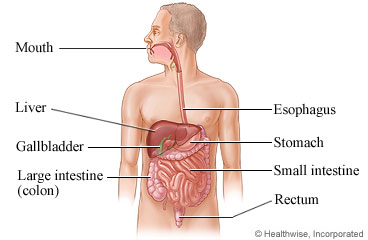
What is tumor embolization?
Tumor embolization shrinks a liver tumor by cutting off its blood supply.
You may get medicine to help you relax and to help with pain before the procedure. The doctor will insert a thin, flexible tube into an artery near your groin. Or the tube may be put in your arm. This tube is called a catheter. The doctor will guide it into the artery that supplies blood to the tumor. Then the doctor will send a dye through the catheter into the artery. The dye is called contrast material. It shows up on X-ray pictures. It allows the doctor to check blood flow to the liver and the tumor.
The doctor will send small particles, chemotherapy, or tiny beads through the catheter into the artery. This stops blood flow to the tumor, causing it to slowly shrink. The tiny beads may contain chemotherapy or radiation to help kill the tumor cells.
Bit by bit, the tumor will be replaced with scar tissue in the months after this is done. This should not affect your liver's ability to do its job.
How do you prepare for the procedure?
Procedures can be stressful. This information will help you understand what you can expect. And it will help you safely prepare for your procedure.
 Preparing for the procedure
Preparing for the procedure
- Be sure you have someone to take you home. Anesthesia and pain medicine will make it unsafe for you to drive or get home on your own.
- Understand exactly what procedure is planned, along with the risks, benefits, and other options.
- If you take a medicine that prevents blood clots, your doctor may tell you to stop taking it before your procedure. Or your doctor may tell you to keep taking it. (These medicines include aspirin and other blood thinners.) Make sure that you understand exactly what your doctor wants you to do.
- Tell your doctor ALL the medicines, vitamins, supplements, and herbal remedies you take. Some may increase the risk of problems during your procedure. Your doctor will tell you if you should stop taking any of them before the procedure and how soon to do it.
- Make sure your doctor and the hospital have a copy of your advance directive. If you don't have one, you may want to prepare one. It lets others know your health care wishes. It's a good thing to have before any type of surgery or procedure.
What happens on the day of the procedure?
-
Follow the instructions exactly about when to stop eating and drinking. If you don't, your procedure may be canceled. If your doctor told you to take your medicines on the day of the procedure, take them with only a sip of water.
-
Take a bath or shower before you come in for your procedure. Do not apply lotions, perfumes, deodorants, or nail polish.
-
Remove all jewelry, piercings, and contact lenses.
At the hospital or surgery center
-
Bring a picture ID.
-
Tell your doctor about any allergies you have.
-
You will be kept comfortable and safe by your anesthesia provider. The anesthesia may make you sleep. Or it may just numb the area being worked on.
-
The procedure will take about 1 to 3 hours.
Current as of: October 25, 2024
Author: Ignite Healthwise, LLC Staff
Clinical Review Board
All Ignite Healthwise, LLC education is reviewed by a team that includes physicians, nurses, advanced practitioners, registered dieticians, and other healthcare professionals.

